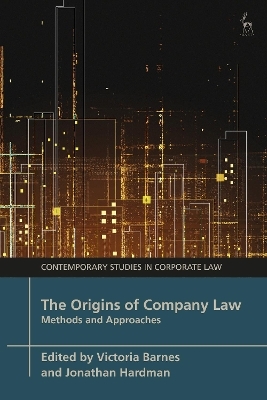
The Origins of Company Law
Hart Publishing (Verlag)
978-1-5099-6444-4 (ISBN)
What were the origins of company law? How did it begin? Why did it change? There is no single answer to these questions. Each discipline, and sub-discipline, has a different approach and method that brings different facets of study to the fore. This multidisciplinary endeavour is immensely valuable for debates taking place now among policy-makers in the UK and US about returning to historic modes of company regulation.
The book brings together Anglo-American scholarship that will not only shed greater light on the history of company law but also influence contemporary debates about our ability to return to, or learn from, the past. Historical research has great value here because it not only generates new insights into the evolution of present legal rules, but also corrects misunderstandings and misapprehensions about them.
The book shows how this body of law developed to become the rules with which we are now familiar. It showcases antecedents of present debates, reveals regulatory lessons from previous legal regimes, identifies instances of path dependency, unpicks pivotal legal events, and explains drivers for legal change. The chapters re-evaluate the history of company law, and the knowledge gathered here will inform the law-making and policy-making agenda.
Victoria Barnes is Reader in Commercial Law at Queen’s University Belfast, UK. Jonathan Hardman is Senior Lecturer in Company and Commercial Law at University of Edinburgh, UK.
Introduction
Victoria Barnes (Queen's University Belfast, UK) and Jonathan Hardman (University of Edinburgh, UK)
1. When did English Company Law Begin?
Victoria Barnes (Queen's University Belfast, UK) and Sally Wheeler (Birkbeck, University of
London, UK)
2. On Mistakes and Trajectories: Using History in Normative Company Law
Jonathan Hardman (University of Edinburgh, UK)
3. New Approaches in Corporate Law History: History as a Resource for Navigating Uncertain Times
Sarah Wilson (University of York, UK)
4. The Unexpected Origins of the US Limited Liability Partnership
Harwell Wells (Temple University, USA)
5. Upending the State’s Power to Regulate Corporate Separateness
Robert B Thompson (Georgetown University, USA)
6. Salomon and Sequana: The Central Significance of Separate Legal Entity
Susan Watson (University of Auckland, New Zealand)
7. Three Regimes: Corporations and Regulation in US History
Naomi R Lamoreaux (University of Michigan, USA)
8. Early American Corporations and the Public Purpose
Eric Hilt (Wellesley College, USA)
9. Capitalism as Personal: Brunner, Mond & Co Ltd (1881-1926)
Lorraine Talbot (University of Birmingham, UK)
10. The Corporate Share: From Membership to Financial Interest to Contractual Design
Ron Harris (Tel Aviv University, Israel)
11. Natural Unity? The Origins of the Principle of Inseparability of Voting Rights from Shares across Jurisdictions
Jennifer Trinks (Max Planck Institute for Comparative and International Private Law, Germany)
12. From Managerialism to Shareholder Primacy: The Role of the Cohen Committee and the Bank of England
Andrew Johnston (University of Warwick, UK)
13. ‘A Few Pike in a Trout River’? Hostile Take-Over Bids and Dividend Restraint: The Debate in Government in the 1950s
Neil Rollings (University of Glasgow, UK)
14. The Right to Repose in Peace: The Making of Modern Company Law
Paddy Ireland (University of Bristol, UK)
15. Epilogue
Victoria Barnes (Queen's University Belfast, UK) and Jonathan Hardman (University of Edinburgh, UK)
| Erscheinungsdatum | 12.12.2024 |
|---|---|
| Reihe/Serie | Contemporary Studies in Corporate Law |
| Verlagsort | Oxford |
| Sprache | englisch |
| Maße | 156 x 234 mm |
| Themenwelt | Geschichte ► Teilgebiete der Geschichte ► Militärgeschichte |
| Recht / Steuern ► EU / Internationales Recht | |
| Recht / Steuern ► Rechtsgeschichte | |
| Recht / Steuern ► Wirtschaftsrecht ► Gesellschaftsrecht | |
| Recht / Steuern ► Wirtschaftsrecht ► Handelsrecht | |
| ISBN-10 | 1-5099-6444-4 / 1509964444 |
| ISBN-13 | 978-1-5099-6444-4 / 9781509964444 |
| Zustand | Neuware |
| Informationen gemäß Produktsicherheitsverordnung (GPSR) | |
| Haben Sie eine Frage zum Produkt? |
aus dem Bereich


